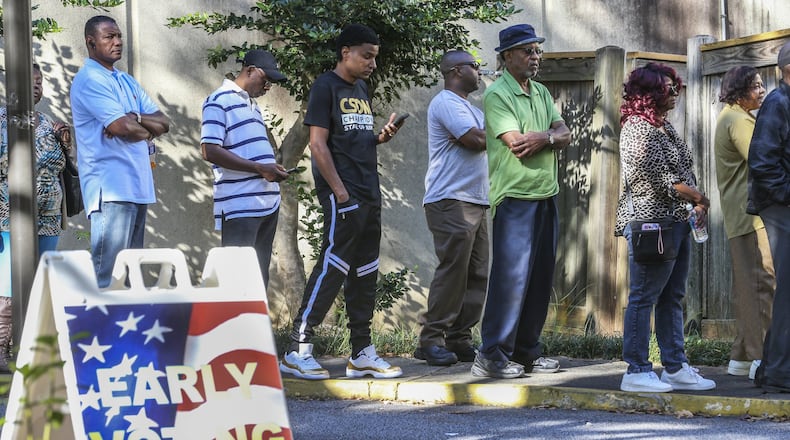As Georgia’s election approaches, more than 53,000 people who tried to sign up to vote haven’t been added to the state’s list of active voters.
These potential voters are in limbo because election officials couldn’t verify information submitted with registration applications.
But they will still be allowed to cast ballots this year if they show photo ID that proves they’re eligible to vote.
The news that these Georgians' registrations are on hold created a controversy in the race for governor this week, with Democrat Stacey Abrams accusing Republican Secretary of State Brian Kemp of trying to suppress votes, and Kemp calling it a "manufactured crisis." A lawsuit filed Thursday by civil rights groups seeks to add pending voters to the state's list of registered voters.
Here are some facts about Georgia’s 53,000 pending voters:
Q: Why are these registration applications on hold?
A: Georgia's "exact match" law, passed last year, requires registration application information to match driver's license, state ID card or Social Security records. Registrations can be stalled for several reasons, including a missing hyphen in a last name, a discrepancy between a maiden name and a married name, or a misspelling in government records.
Q: Can Georgians whose registrations are pending still vote?
A: Yes, they can cast a ballot if they show a government photo ID that substantially matches the registration application. State law already requires voters to show photo ID before casting a ballot in person, and that identification can also resolve registration problems. ID can be produced either on Election Day, at early voting locations, at county election offices or by mail. Georgia accepts six kinds of photo ID: a state driver's license, a state or federal ID card, a valid employee ID from any government agency, a U.S. passport, a U.S. military ID or a tribal photo ID.
Voters on the pending list can’t vote by mail on absentee ballots until they resolve discrepancies with their voting registrations.
Q: If everyone can vote anyway, why does it matter if their registrations are pending until they verify their information?
A: Critics of Georgia’s law say citizens whose registrations are on hold might be discouraged from voting if they believe they’re unable to cast a ballot. Pending voters’ registration applications are canceled after 26 months if they don’t resolve discrepancies. And the need to verify voting information creates another step in the process to becoming registered voters. Because poll workers have a lot of discretion over registration matters, some worry that these voters will still have trouble when they try to vote.
Q: Who are these 53,000 people whose registrations are on hold?
A: About 80 percent of applicants put on pending status are African-Americans, Latinos and Asian-Americans, according to a federal lawsuit filed Thursday by civil rights groups. The lawsuit, which demands that pending voters become active voters, alleges that the "exact match" is discriminatory because it disproportionately affects minority groups. The Georgia Secretary of State's Office said the reason that many of the pending registrations are from minorities is that they were submitted on paper by organizations that specifically sought to register minorities.
Q: When pending voters show photo ID, do they have to use a provisional ballot?
A: No. Those who verify their registration information can cast their ballots on Georgia’s touchscreen electronic voting machines, just like every other registered voters. Only those pending voters who are unable to correct their registration information would use provisional ballots, which are paper ballots that aren’t counted unless voters’ information is confirmed in the days after the election.
Q: What is Kemp’s role in the “exact match” law?
A: As secretary of state, Kemp is responsible for enforcing Georgia's election laws, including the "exact match" requirement. Even before it was part of state law, Kemp's office required that registration applications match government records. Civil rights groups and Kemp's office settled a lawsuit over the matching process last year, but shortly afterward the Georgia General Assembly and Gov. Nathan Deal made it into law.
Q: Are local election officials trained to resolve discrepancies on voter registrations?
A: When presented with a photo ID, election officials will reconcile the identification with registration records as long as they “substantially match.” Election officials are given discretion to decide whether the ID is sufficient to resolve discrepancies. A deputized registrar in each county is trained to decide whether the photo ID verifies an individual’s registration, according to the Secretary of State’s Office.
Q: How can you check whether you’re registered to vote?
A: The Georgia My Voter Page, at www.mvp.sos.ga.gov, allows anyone to check their registration information. The website shows voters their precinct locations, absentee ballot applications and sample ballots. For voters whose registrations are on hold, the website will display a message that they should contact county election offices to verify their information.
About the Author
Keep Reading
The Latest
Featured




